UNDERGRADUATE RESEARCH BLOGS
The Office of Undergraduate Research sponsors a number of grant programs, including the Circumnavigator Club Foundation’s Around-the-World Study Grant and the Undergraduate Research Grant. Some of the students on these grants end up traveling and having a variety of amazing experiences. We wanted to give some of them the opportunity to share these experiences with the broader public. It is our hope that this opportunity to blog will deepen the experiences for these students by giving them a forum for reflection; we also hope these blogs can help open the eyes of others to those reflections/experiences as well. Through these blogs, perhaps we all can enjoy the ride as much as they will.
EXPLORE THE BLOGS
- Linguistic Sketchbook
- Birth Control Bans to Contraceptive Care
- A Global Song: Chris LaMountain’s Circumnavigator’s Blog
- Alex Robins’ 2006 Circumnavigator’s Blog
- American Sexual Assault in a Global Context
- Beyond Pro-GMO and Anti-GMO
- Chris Ahern’s 2007 Circumnavigator’s Blog
- Digital Citizen
- From Local Farms to Urban Tables
- Harris Sockel’s Circumnavigator’s Blog 2008
- Kimani Isaac: Adventures Abroad and At Home
- Sarah Rose Graber’s 2004 Circumnavigator’s Blog
- The El Sistema Expedition
- The World is a Book: A Page in Rwand
Neha Gupta
Neha Gupta
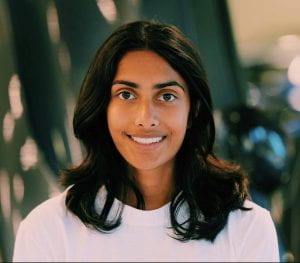
Which grant that you received do you want to talk about?
Summer URG
Please provide a brief summary of your research.
I was investigating how A549s, a patient derived lung cancer cell line, essentially hijack the circadian clock. Every cell in our body has a circadian rhythm, and we can visualize how long a cell’s circadian period lasts in a device called the LumiCycle. There have been numerous studies investigating the relationship between circadian disruption (via shift work) and the development of cancer. Previous research by Dr. Clara Peek showed a bidirectional interaction between HIF-1a (a protein involved in the cellular response to low oxygen conditions) and BMAL1 (a core circadian clock component). Since tumor cells are naturally in low oxygen conditions, this relationship is pathologically relevant. Other scientists showed that circadian disruption leads to lung tumorigenesis, but we were investigating the opposite pathway – that being how A549s take over the circadian clock to benefit their growth and proliferation . My goal was to treat cells with different drugs that worked on our proposed signaling pathway and measure the length of the cell’s circadian period.
What made you initially interested in researching your project in particular?
I didn’t have a particular interest in circadian biology until I took Bio 203, where we briefly went over how the circadian clock works. From there, I knew I wanted to work in a circadian lab. I had a previous interest in muscle physiology and injury repair, which is the main focus of the Peek lab and my initial reason for joining. When I arrived, one of the research techs, Adam Steffeck, mentioned that he needed help with the lab’s lung cancer project. Although lung cancer and muscle physiology share few commonalities, the shared circadian component was my main motivation for helping with this project. From there, I began training in the lab and was ready to commit to the project full time when summer rolled around.
What made you interested in pursuing (interdisciplinary) research more broadly?
I knew I wanted to start doing research because of my classes. I always found everything we learned so interesting, but never felt like I could fully grasp how these concepts applied to a real world setting. Techniques always seem practical when learning about them in lecture, but I wanted to experience the scientific process myself. I wanted to see how the things we learned failed, understand why they failed and make judgement calls as to what the next move should be to push the project forward. I saw research as a way to bring the content we cover to fruition, which was my main motivation to get involved.
Describe your experiences with research thus far. Was it tricky? What skills do you think you’ve gained?
I’ve loved my experience so far, but I can’t say that every moment has been easy. Seeing your experiments that you’ve planned and set up for weeks fail because of reasons outside your control can be frustrating, and you have to learn to come back and think about your own work critically. I think the trickiest part is being able to ask the right questions at the right times. If you didn’t get the result you wanted, was it because of a procedural error? Or is something mechanistic? I think I’ve gotten better at knowing when and where to ask these questions over the summer. Furthermore, my bench skills and scientific intuition have increased greatly over this time as a result of the experience, even when things failed.
Any tips or advice you have for students similar to you that are interested in pursuing undergraduate research?
I think the best thing I’ve learned over the past few months working in the lab is to never feel scared to ask questions or reach out to others, whether that is your PI, a potential PI, or someone who’s project you are particularly interested in. There were a few times I was scared to reach out to my PI with questions or to present data, just because I was worried she would be too busy. Those meetings, which I thought would only last a few minutes, often turned into hour long discussions criticizing the pathway and developing new experiments. I am by no means an expert in the field, so it was critical for me to ask questions to further my understanding. Even if you think your questions are elementary or are wasting someone’s time, everyone was in your shoes learning at some point. People are always willing to help if you show initiative, so never, ever be afraid to reach out.
Cydney Brown
Cydney Brown
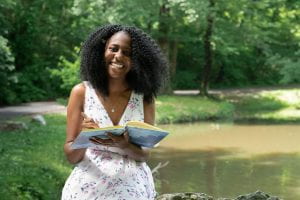
Which grant that you received do you want to talk about?
Summer Undergraduate Research Grant
Please provide a brief summary of your research.
For 8 weeks (June 12th-July 31st) I researched eight Black female activists during the Civil Rights Movement (1954-1968) whose contributions appeared invisible in history because as Bernice McNair Barnett elucidates, Social Movement scholarship focuses on male leaders. My goal in this project was to recognize Black women and their leadership. The intersection of these women’s identities have resulted in the erasure of their contributions to American History furthering the notion that men were the only leaders during this time. The purpose of this project was to show Black women the power their voices hold, by highlighting the voices of Black figures that came before them. The women I researched are as follows: Claudette Colvin, Gloria Richardson, McCree Harris, Septima Poinsette Clark, Pauli Murray, Diane Nash, JoAnn Robinson, and Georgia Gilmore. I wrote first-person poetry from the perspective of the women I studied using journal articles, interviews, archives, and oral histories to elucidate their lives. I chose poetry as the medium to tell the stories of these women because of its accessibility and relatability as a modern medium of communication.
What made you initially interested in researching your project in particular?
Originally I wanted to do a research program, but after meeting with Megan Novak we realized I already had an interest in doing poetry centered research. Megan helped me to hone in on what marginalized community I wanted to focus my poetry on, so that my research wasn’t too broad.
What made you interested in pursuing (interdisciplinary) research more broadly?
I became interested in pursuing research after taking SESP 251 Pathways class that focused on doing meaningful work during the summer through SURG or SIGP. I also attended events where UGR would present, so I was very interested in doing research and poetry.
Describe your experiences with research thus far. Was it tricky? What skills do you think you’ve gained?
Research is fun, rewarding, and thorough. I found it fun researching each women and learning anecdotes about them that I was never taught in history class. It was difficult when I couldn’t find information on some of the women after trying different avenues to obtain it. It was also tricky revising poems, some poems would have revisions that would take a few days, while others would take weeks. From my research experience I have gained patience and flexibility. Some days, I would have to wait for sources to come through interlibrary loan, so I would be flexible and start researching another activist.
Any tips or advice you have for students similar to you that are interested in pursuing undergraduate research?
Schedule a meeting with Office of Undergraduate Research they are really helpful in understanding how your interests can become a research opportunity.
What was your favorite childhood story (written, spoken, or film)?
My favorite childhood story was The Kissing Hand by Audrey Penn, my mom used to read it to me when I was younger.
Lucia Barnum
Lucia Barnum
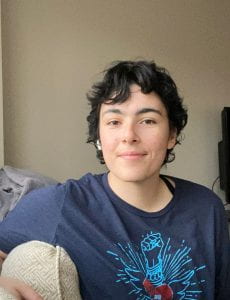
Please provide a brief summary of what you plan to research over the summer, where you plan to go, and why you chose those locations.
This summer, I will research community mobilization and social organizing in the wake of fire disasters in Brazil, Argentina, Portugal, Greece, Ghana, and Australia. Each of these countries has experienced a major fire event in the last six years, or has otherwise grappled with how national fire policy fails to meet the needs of communities on the front lines of these disasters. In talking with experts and stakeholders, I hope to develop best practices for how fire and disaster management policy can meet the needs of those most impacted by these tragedies.
What made you interested in pursuing interdisciplinary research?
As a journalism major, I’ve taken many courses that emphasize the importance of interviews, observation, and storytelling. As a researcher, I find it essential to incorporate this same multidimensional approach. Interdisciplinary research is especially important in this field: while “natural” disasters are oftentimes portrayed as only being about the environment, it is imperative to consider them socio-ecological events.
Describe your experiences with research thus far in your career.
I currently work as a Leopold Fellow with Dr. Paul Gillingham on his research about Mexican history. I also received a SURG the summer after my freshman year, which I used to create a three-part narrative podcast series on a local election in Palatine, IL. Last summer, I was a Peer Mentor and helped SURG awardees as they conducted their own research. I have also written sociological research papers for various classes at Northwestern, but this will be my first independent social science project of this scope!
What made you initially interested in researching your topic in particular?
Growing up in Northern California, wildfires are an essential, unavoidable part of life. I’ve seen community organizing around fire disaster with my own eyes. I want to highlight this unique form of expertise to help give stakeholders, including my own neighbors, the necessary tools to create safer communities.
Any tips or advice you have for students interested in pursuing undergraduate research?
I would encourage anyone interested in undergraduate research to shoot their shot! It can be a daunting process, but has been one of the most rewarding parts of my time at Northwestern so far. When I started writing my first research proposal, I had no idea what I was doing, but the OUR office has so many great resources that helped me grow my confidence.
Which aspect of your trip are you most excited about?
I’m excited to explore nature in other parts of the world! A great part of my proposal is that it will (hopefully) allow me to go outside of major cities and into more rural areas. I’m extremely grateful for the opportunity to get outside my comfort zone and appreciate the natural beauty these locations have to offer.
Do you collect anything?
I collect magnets! It’s a habit I inherited from my grandmother, whose fridge is covered in magnets from different places she and her loved ones have visited.
What skill would you most like to learn?
I’m not a very musical person, but have recently started teaching myself the guitar. I’d love to learn how to play a wider variety of instruments, but for now, I’ve got my work cut out with just one.
Alexis Schwartz
Alexis Schwartz
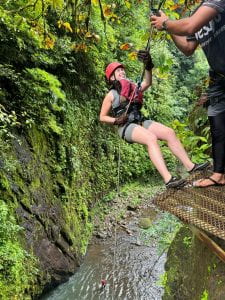
Which grant that you received do you want to talk about?
Undergraduate Language Grant
What language did you study and why?
Professionally, I chose to study Spanish because I want to go into civil rights law, and I want to be able to work with the many people in the U.S. in need of legal support that speak Spanish. More personally, I want to be able to communicate with as many people in my communities and around the world as possible.
What program did you attend and why did you choose it?
I chose to study at a language institute in San Jose, Costa Rica. I knew I wanted to be in San Jose because it is surrounded by universities and museums, making it a very good place to meet other people my age as well as learn a lot about the the country. As a nature lover, I couldn’t miss the chance to see the incredible conservation efforts that Costa Rica has worked on.
Describe your experience doing summer language study. Was it tricky? How do you think your language skills improved?
Living in a Spanish-speaking country while learning Spanish did wonders for instilling the language in my mind. I had no choice but to practice, I would wake up and speak Spanish at the breakfast table with my family, then go to hours of Spanish classes, then go to lunch where I would have to speak Spanish to order my food, then have tandem conversations with English students where I would speak in English for about 30 minutes. This level of constant exposure made it a necessity for me to improve my Spanish to function in the world around me. After my experience in Costa Rica, I believe there is no way as effective to learn a language as intensive immersion. When I first arrived in Costa Rica, I was entirely overconfident in my language skills. I had just completed a year of Spanish at Northwestern and was feeling very good about where I was. But, as soon as I arrived at my host family, who does not speak any English, I found that I could barely understand anything they were saying, much less participate in any form of conversation with them. However, in my last week there, I found myself at the dinner table in the midst of an hour-long conversation with my host mom. This is just one specific instance of growth, but throughout my time there, I gradually felt myself becoming more and more capable of speaking and conversing in Spanish.
Did intensive summer language study change or solidify any of your future goals? If so, how?
It absolutely did! It solidified my goal of becoming bilingual for the work that I want to do in the future. I realized how crucial a common language is to building relationships, and I want to be able to truly accomplish that connection throughout my professional and personal life.
Do you have any tips or advice for students similar to you that are interested in pursing intensive language study?
You absolutely have to stay with a host family! I really think this is what pushed my language learning to the next level because I simply had to use Spanish to communicate with the people I was living with. I also think choosing a location that is not overly touristy is really important because, at least for me, if there is the option to lean on English as a crutch when you go to restaurants or stores, you won’t practice your language as much as you could.
If your (speaking) voice were an instrument, what do you think it would be?
In my heart I want it to be the bass clarinet but there is such a good chance I’m wrong.
What was your favorite childhood story?
One time when I was 7 I “accidentally” cut a massive chunk out of my friend’s super long and gorgeous hair like near her chin. It was really bad.
Aya Alikhan
Ali Alikhan
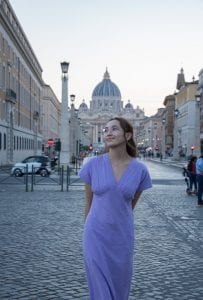
Which grant that you received do you want to talk about?
Undergraduate Language Grant
What language did you study and why?
Italian because my both SIGP and JR programs took place in Italy
What program did you attend and why did you choose it?
I attended an intensive Italian course at Scuola Leonardo Da Vinci in Florence
Describe your experience doing summer language study. Was it tricky? How do you think your language skills improved?
In the span of 8 weeks, from the beginner level I was able to get to intermediate. It was a very fun and culturally immersive experience as well. I traveled around Tuscany, visiting alpaca farm, vineyards, Florentine mosaic, Italian leather artisan houses, castles, museums, and even learned how to make pasta from scratch.
Did intensive summer language study change or solidify any of your future goals? If so, how?
Yes, it definitely made me narrow down what kind of reporting I would like to do in terms of my career, also I realized that I would most probably move to Europe after graduation.
Do you have any tips or advice for students similar to you that are interested in pursing intensive language study?
Don’t be afraid of making friends with teachers, staff and your host family. Usually, connections like that make you practice your language skills and open so many new opportunities.
What would you name a boat if you had one?
Wonder
What is something that you could give a 10 min presentation on right off the cuff?
Cooking and baking
If your (speaking) voice were an instrument, what do you think it would be?
Violin
What was your favorite childhood story (written, spoken, or film)?
Harry Potter
What was a memorable interaction that you had on campus this week?
We had a Pulitzer Prize guest speaker
Sophia Bonfigli
Sophia Bonfigli
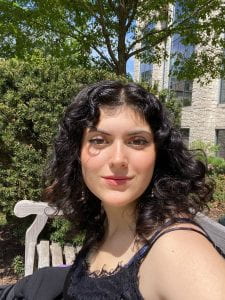
Which grant that you received do you want to talk about?
Summer URG
Please provide a brief summary of your research.
I research bioactive nanomaterials that can be used for applications in regenerative medicine. This summer, I looked at a system that uses a self-assembling nanofiber that acts like a track for dancing sliders with attached bioactive sequences. The sequence on the sliders was IKVAV, a laminin mimetic that can be used to promote adhesion and dendrite development of neurons in the brain and spinal cord.
What made you initially interested in researching your project in particular?
I loved biology and have always found regenerative medicine extremely fascinating. Using the body’s own machinery to recovery otherwise permanent or life-threatening injuries genuinely feels magical to me, so I’m so excited to be part of such impactful research.
What made you interested in pursuing (interdisciplinary) research more broadly?
I always enjoyed hearing about other people’s projects and thought it was so cool to uncover new information about the world. Research is a way to do hands-on work to satiate my curiosity and use the information I was learning in class productively. I also wanted to blend my science knowledge with artistic skills, which is something that I do often now.
Describe your experiences with research thus far. Was it tricky? What skills do you think you’ve gained?
Research can feel like a bit of a puzzle sometimes. You get to design experiments and run different tests to collect puzzle pieces, and then you use your knowledge and understanding to try and put the pieces together. I love being able to work together with others and explore new areas of science to progress in my project, all while learning new techniques and developing a plethora of skills. It can be frustrating sometimes when you can’t understand your results or don’ know how to validate a theory.
Any tips or advice you have for students similar to you that are interested in pursuing undergraduate research?
I would recommend just going for it! Nobody expects you to know anything going in, and the more you are willing to learn, the farther you can go! Being in a lab, I feel like being part of a family. You don’t need any crazy skills to jump into research.
What is something that you could give a 10 min presentation on right off the cuff?
Puppeteering
What was your favorite childhood story (written, spoken, or film)?
Spirited Away (Movie)
Rachel Spahn
Rachel Spahn
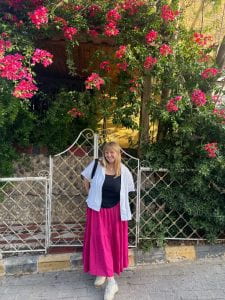
What language did you study and why?
I studied Arabic because I wanted to improve my language skills to be able to speak about complex topics, but more importantly, I wanted to better understand the language in a cultural context from native speakers.
What program did you attend and why did you choose it?
My experience at CET Jordan’s summer intensive program exceeded my expectations. I studied with CET through their semester abroad program in the fall of 2022, so I had reasonable expectations for what returning to Jordan would look like for me. Still, I was beyond pleased with how the program helped me learn Arabic through the intensive classroom experience, field-based excursions throughout the country, personalized time with professors, and the driven cohort of students.
Describe your experience doing summer language study. Was it tricky? How do you think your language skills improved?
We spent up to five hours daily speaking, listening, reading, and writing in Arabic in a classroom setting (where I worked with five other students). For example, we read and discussed a famous Arabic novel, “Men in the Sun” by Ghassan Kanafani; we watched Arabic news to discuss our course’s central theme ‘phenomena’ including the study of women’s rights, child labor, and climate change; we had weekly presentations on class topics and field-based activities, such as a presentation on our takeaways from a trip to a local radio station. We were regularly assessed on these skills and also took the ACTFL Oral Proficiency Interview at the end of the summer. Last fall, I achieved Advanced Mid and advanced to Advanced High on my interview this summer. When I studied abroad in the fall, I felt like I was learning a new word every two minutes and was solely focused on language acquisition. While I still learned hundreds of new words this summer, I was thankful that I had a different experience while language learning. I prioritized solidifying my confidence in my language skills: I would not resort to English if someone did not understand me, I learned how to speak casually and conversationally by engaging in more conversations with local shop owners and with taxi drivers, and by the end of the summer, I was able to confidently call taxis, bargain at local shops, and ask new people for help if I needed it. It became clear to me that while it is beneficial to focus on mastering words and complex structures, I could also grow my language skills by speaking in a wider variety of settings and with people from different Arabic-speaking countries. This was difficult and often made me feel vulnerable, but language learning is not linear, and I think that this experience gave me the confidence to continue making mistakes and learning from them.
Did intensive summer language study change or solidify any of your future goals? If so, how?
As for my academic development, my language acquisition from this summer will now allow me to take more advanced Arabic courses at Northwestern to complete the new Arabic minor, which I am very excited about. I also have more resources to keep practicing my language skills, including the textbooks I used in class, reading and listening to the news, and even simply staying in touch with my Arabic-speaking friends from Jordan. Through the program, I also interned at a local NGO that promotes women’s and children’s economic and social empowerment in Jordanian society. I used Arabic to translate the company’s resources and extrapolate governmental data written in Arabic. This showed me how I could use Arabic in a professional setting and especially in a way that can help people and communities, which I hope to do in the future. In particular, I would love to use Arabic to work in the government/ for a foreign policy agency to facilitate cross-cultural and multi-national discourses. Not only did the summer solidify my career goals, but I also learned a lot more about how I learn and can support others with their learning. It was challenging to commit to the language pledge when it would be a lot easier to resort to English with my student cohort. But our commitment to each other and ourselves and as a result, our much-improved language skills, taught me a lot of perseverance and resilience. Immersing myself in a new language and culture was uncomfortable at first. It made me a lot more grateful for my friendships and support systems, especially the locals I met that were patiently willing to listen to me stumble over words sometimes. I appreciated learning about a new culture and environment by living in it, and I am forever thankful to CET, my program, and the ULG for showing me I could.
Do you have any tips or advice for students similar to you that are interested in pursing intensive language study?
If you are studying in a new country, find communities and places that connect you to home! My program required me to speak exclusively in Arabic for the whole summer; I felt more comfortable exploring new areas while listening to my favorite songs in English and sometimes just drinking a mocha from Starbucks. I started writing down one good thing that happened and one thing I was grateful for every day, which was SO grounding! I also love looking back and reading about my experience now that I’m back at NU. Give yourself some grace. Prioritize self-care. You’ve got this!
What is something that you could give a 10 min presentation on right off the cuff?
Why the color green is the best color ever
Fatima Shafiq
Fatima Shafiq
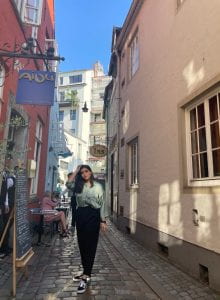
What language did you study and why?
German because I plan on doing my Journalism Residency and my masters in Germany
What program did you attend and why did you choose it?
I chose Goethe because it is recognized for its immersive program and skilled teachers.
Describe your experience doing summer language study. Was it tricky? How do you think your language skills improved?
My daily schedule was packed, with classes from 8:00 AM to 1:00 PM, followed by an intensive private lesson lasting 1 hour and 45 minutes. I also took online lessons that exceeded my 120 hours to practice my German further. This demanding routine was hectic but incredibly effective in making me fully immerse in the German language. It pushed me to the limits of my language abilities and compelled me to adapt quickly. The program’s quality was exceptional in every aspect. The language instruction was top-notch. Our instructors were dedicated to ensuring we remained fully immersed in the German language, and they discouraged us from speaking in our native languages. Group assignments, pair work, and regular tests challenged us to apply what we learned in class actively. Homework was a routine part of our studies, and it was diligently checked and discussed during our lessons. What truly enhanced my experience was the opportunity to interact with other students in the program. I made friends from various backgrounds, including a Dutch-Colombian friend, an Italian, and a Turkish classmate, among others. We organized post-class hangouts, where we practiced speaking in German and supported each other’s language learning journeys. These friendships remain strong, and we continue to communicate in German. The Goethe Institute also organized daily activities, such as visits to Kunst Halle (Art Museum), bar outings, beach trips, and A1 practice sessions. Participating in these activities not only exposed me to different aspects of German culture but also allowed me to make lasting connections with fellow participants. Interacting with the local community and native speakers was another invaluable aspect of my program. Whenever I went grocery shopping or ordered food, I conversed with locals in German. They were friendly and corrected my mistakes, creating a comfortable and supportive learning environment.
Did intensive summer language study change or solidify any of your future goals? If so, how?
It has equipped me with the language skills needed to pursue my dream of doing my masters in Germany and working in German media organizations. With a strong foundation in German up to B1 level, I am well-prepared to excel in my future academic endeavors and professional pursuits. My competence in German has enormous potential for enhancing my academic ambitions. Journalism and strategic communication are disciplines that need a global perspective as well as the capacity to communicate successfully across cultural boundaries. German proficiency provides the door to a multitude of academic resources, research opportunities, and networking chances in Germany, a country noted for its expertise in media and communication studies. It has positioned me favorably for my Journalism Residency and professional opportunities with esteemed German media organizations like Deutsch Welle, Der Spiegel, and Reflectist, which require a high level of language proficiency.
Do you have any tips or advice for students similar to you that are interested in pursing intensive language study?
Embrace your passion for learning a new language wholeheartedly, dedicating your entire effort. Pursue this endeavor not solely for monetary gain, but as a means to acquire a valuable skill in the form of a new language. The experience of learning a new language is exceptionally rewarding, extending beyond linguistic proficiency. It offers a profound understanding of the culture, traditions, and values of the people and country associated with that language.
What would you name a boat if you had one?
Not Titanic
What is something that you could give a 10 min presentation on right off the cuff?
Pakistan’s political crisis
If your (speaking) voice were an instrument, what do you think it would be?
A sitar (South Asian instrument)
What was your favorite childhood story (written, spoken, or film)?
Interstellar
What was a memorable interaction that you had on campus this week?
I met Laila Al-Arian, a Journalist from A l Jazeera English
Jason
Jason Yang
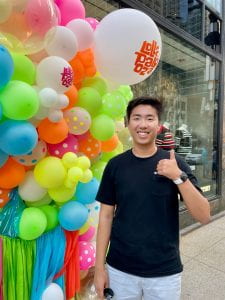
Please provide a brief summary of your research.
The sense of touch is critical for humans, and our daily interactions with objects require accurate tactile perception. To better understand the associated neural processes, functional magnetic resonance imaging (fMRI) during tactile stimulation can identify how tactile signals travel within the central nervous system. However, there is a lack of stimulators that provide constant forces resembling the natural grip forces used in object manipulation. We developed a novel system that delivers accurate, localized, and automated constant-force stimulation that can be used in studies of tactile perception in various populations, such as those with stroke.
What made you initially interested in researching your project in particular?
I have always had an interest in the technology behind medical imaging, and I find it fascinating that we have the capability to see within the body. When I joined the Robotics and Sensorimotor Control Lab, which was focused on researching how humans perceive somatosensory signals, I wanted to integrate neuroimaging into the study of tactile perception. My PI and I worked together to develop a new research direction utilizing fMRI to study the neural correlates of tactile perception.
What made you interested in pursuing (interdisciplinary) research more broadly?
I enjoy trying to tackle complex challenges on the forefront of a particular topic, and I find it rewarding that my work will eventually have a real impact on people around the world. I also love the interdisciplinary aspect of research and being exposed to so many different industries and fields. Collaborators on my project included roboticists, mechanical engineers, computer scientists, neuroscientists, and more!
Describe your experiences with research thus far. Was it tricky? What skills do you think you’ve gained?
Over the 2-3 years that it took to complete my research, there were certainly some challenges. I think the hardest part was trying to coordinate the different components of the project and ensuring that each team knew what the end goal was. I definitely developed skills in effective communication and delegation. Also, while it was daunting at first, I found it especially rewarding to be able to work and make decisions independently. My experience with research has certainly prepared me for working in the “real world.”
Any tips or advice you have for students similar to you that are interested in pursuing undergraduate research?
I would say to find something you are truly interested in, especially if you plan on starting a project and following through with it to the end. On this point, I think finding a lab or PI that allows you to take control over a project is especially important. Being able to go through the whole “scientific method” was the best way for me to develop my research skills.
If you had unlimited time, money, resources, support, etc. what is something you would research?
How to cure color blindness (I’m color blind…)
Favorite bathroom on campus?
First floor of Bienen
Lynn
Lynn Ahn
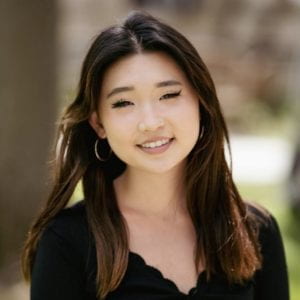
Please briefly summarize your research.
As an Emerging Scholar, I conducted literature reviews, critically analyzed testimonios, and edited Dr. Alyssa Garcia’s manuscript, Moral Discourses, Regulated Bodies: Sex, the State, and Subjectivity in Cuba.
What made you interested in pursuing (interdisciplinary) research more broadly?
I was interested in getting hands-on experience with research and academia.
How has it been working with faculty to transition from an assistant position to a more independent role?
Working with a faculty mentor helped with independent research because I was able to get experience before starting my own project. It made starting an independent project less intimidating.
What’s been your favorite part about being in a cohort with other scholars?
My favorite part has been the community, especially with people who share similar experiences to me.
Do you have any tips or advice for first years similar to you who are interested (but maybe hesitant) to apply for a 15 month long program?
You should go for it! It is intimidating but it is a great experience. It isn’t easy, but you will learn a lot.
If you had unlimited time, money, resources, support, etc. what is something you would research?
Victim’s Economic Security and Safety Act, Employment protections for survivors of sexual and domestic violence
Favorite bathroom on campus?
Lincoln has the best bathrooms
What’s the most interesting thing you’ve learned/read about/listened to this week?
I finished On Earth We’re Briefly Gorgeous yesterday!
What is your most useless talent?
I’m really good at putting on fake eyelashes
